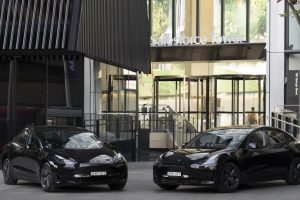Key Points
- 🚚 The Tesla Semi outperformed its rivals in real-world tests for range, charging efficiency, and performance.
- 🔌 During the Run on Less event, a Tesla Semi by PepsiCo traveled 1,076 miles in a day with fast charging sessions.
- 📏 The Tesla Semi demonstrated its capabilities, even with a gross vehicle weight close to the limit for Class 8 trucks.
- 🏆 The Tesla Semi surpassed other vehicles in terms of the average number of miles traveled per day.
- 💬 PepsiCo’s director of fleet transformation praised the Tesla Semi’s performance and alignment with their business.
- ⚡ Tesla’s charging capabilities and range make it a leader in the electric truck market.
- 🚀 Tesla’s Semi is expected to contribute to sustainability efforts as production ramps up.
- 📅 California has approved regulations to phase out internal combustion engine truck sales by 2036, creating opportunities for electric trucks.
The Tesla Semi outperformed its rivals in real-world tests, demonstrating its advantages in range, charging efficiency, and performance by a significant margin. The results of the Tesla Semi placed a definitive period on the issue of whether battery electric trucks are feasible for the transport sector.
During the Run on Less event, which was organized by the North American Council for Freight Efficiency, a Tesla Semi operated by PepsiCo Inc. traveled 1,076 miles in a single day with three relatively brief 750-kW fast charging sessions. The charging sessions brought the Tesla Semi’s charge to roughly 47%, then 89%, and then 52%.
More importantly, PepsiCo said 60% of the miles driven by the Tesla Semi over the 18 days were with a gross vehicle weight of more than 70,000 pounds. That’s pretty close to the 82,000-pound limit for Class 8 trucks like the Tesla Semi, and a typical weight for the logistics industry, as noted in an Automotive News report.
The Tesla Semi also outperformed its peers at the Run on Less event for the average number of miles traveled per day. Amanda DeVoe, director of PepsiCo’s fleet transformation and strategy, noted that the company was quite happy with the Tesla Semi’s performance.
“When we looked at the metrics during the run, we were very pleased with how the Semi performs. What was most meaningful is that the Semi aligned with how our business operates,” DeVoe said.
John Boesel, CEO of Calstart, a clean transportation organization, praised Tesla Semi’s charging capabilities. “Tesla is the leader in terms of performance and range. They are also the only ones demonstrating superfast charge capability,” Boesel said.
Overall, PepsiCo’s best-performing Tesla Semi traveled an average of 574 miles per day over the course of 18 days. The next best non-Tesla vehicle was WattEV’s Nikola Tre BEV, which traveled an average of 255 miles per day. OK Produce’s Freightliner eCascadia averaged 181 miles per day, and the Performance Team’s best-performing Volvo VNR Electric averaged 175 miles per day.
Tesla is still ramping up production of the Semi, but it is expected to play a major role in the transition to sustainability if the EV maker is able to ramp its production properly. California has already approved the Advanced Clean Fleets regulation, which will phase out internal combustion engine truck sales by 2036, so the opportunity is definitely there.





